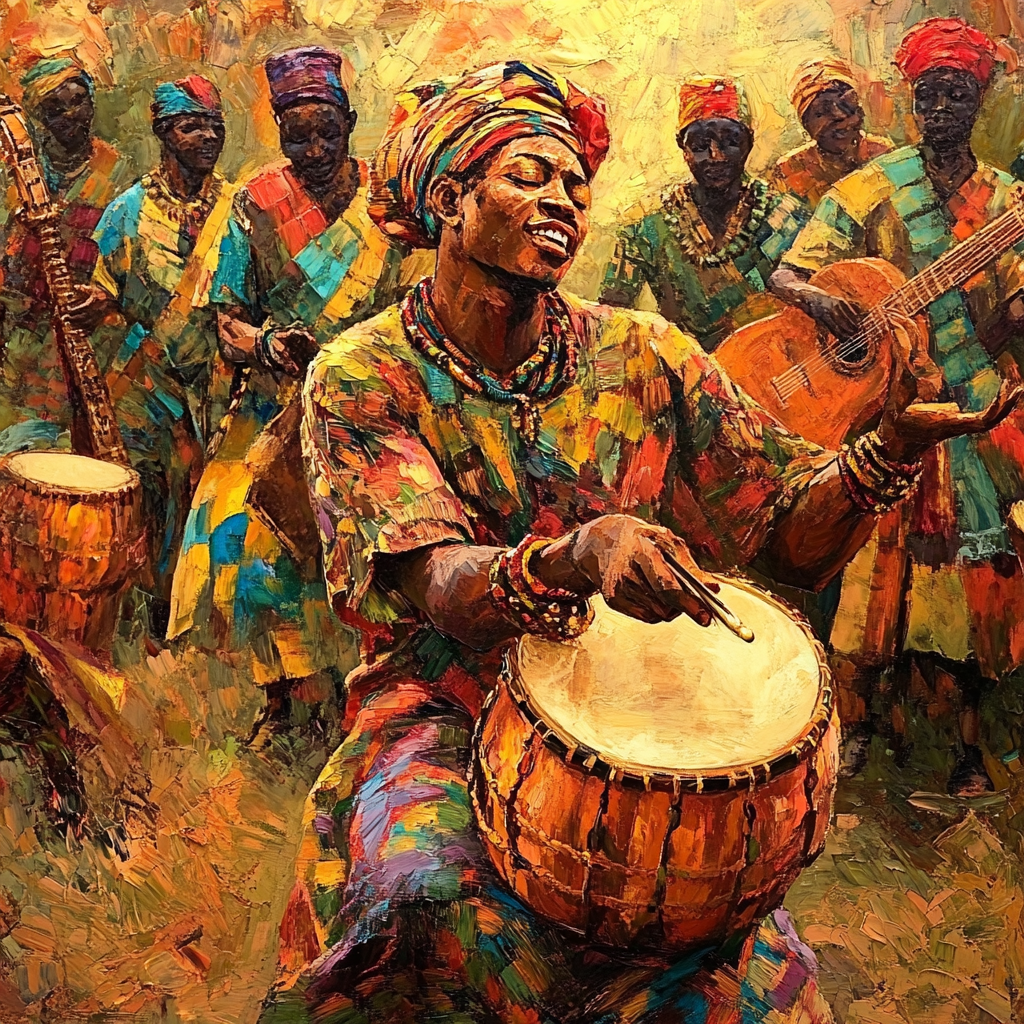Table of Contents
What Are Afro-Beats?
Afro-beats, often referred to as Afrobeats, is a vibrant and dynamic genre of music that has captured the attention of listeners around the globe. Originating from West Africa, particularly Nigeria and Ghana, this genre is a fusion of traditional African rhythms, contemporary pop music, and various influences from genres such as hip-hop, dancehall, and R&B. As the world becomes increasingly interconnected, Afrobeats is making the world listen, transcending borders and cultural barriers. This article discusses the origins of Afro-beats, its key artists, and the factors contributing to its global rise.

What is the Difference Between Afrobeat and Afrobeats?
Defining Afrobeat: Origins and Characteristics
Afrobeat is a genre that emerged in the late 1960s and 1970s, primarily associated with the legendary Nigerian musician Fela Kuti. It is characterized by its complex rhythms, heavy use of percussion, and a blend of jazz, funk, and traditional African music. Afrobeat often features long instrumental sections, intricate horn arrangements, and socially conscious lyrics that address political and social issues in Nigeria and beyond. Kuti’s music was not just entertainment; it was a powerful tool for activism, reflecting the struggles and aspirations of the African people.
What Are Afro-beats?
In contrast, Afrobeats, often written as “Afro-beats,” represents a more contemporary evolution of the genre. Emerging in the early 2000s, Afrobeats incorporates a broader range of influences, including hip-hop, dancehall, and electronic music. This genre is characterized by its catchy melodies, danceable rhythms, and a focus on production quality. Unlike Afrobeat, which is often lengthy and complex, Afrobeats songs tend to be shorter and more radio-friendly, making them appealing to a global audience. The term “Afrobeats” serves as an umbrella term for various styles and sounds that have emerged from West Africa, showcasing the diversity of African music.
Key Differences in Rhythm and Style
The key differences between Afrobeat and Afrobeats lie in their rhythm and style. Afrobeat is known for its intricate polyrhythms and extended instrumental sections, while Afrobeats focuses on a more straightforward, danceable beat that is often accompanied by electronic elements. Additionally, Afrobeat tends to have a more serious tone, often addressing political issues, whereas Afrobeats embraces a celebratory and upbeat vibe, making it a staple in parties and clubs worldwide. This evolution reflects the changing landscape of African music and the influence of globalization on contemporary sounds.
How Did Fela Kuti Influence the Afrobeat Genre?
The Legacy of Fela Kuti in Nigerian Music
Fela Kuti is often hailed as the pioneer of Afrobeat, and his influence on the genre cannot be overstated. His innovative approach to music combined traditional African sounds with jazz and funk, creating a unique sound that resonated with audiences both in Nigeria and internationally. Kuti’s music was deeply rooted in African culture, and he used his platform to address social injustices, corruption, and the struggles of the Nigerian people. His legacy continues to inspire a new generation of artists who seek to blend traditional sounds with contemporary influences, ensuring that Afrobeat remains a vital part of the Nigerian music scene.
Fela Kuti’s Unique Blend of Funk and Highlife
Kuti’s unique blend of funk and highlife music laid the groundwork for the development of Afrobeats. Highlife, a genre that originated in Ghana, incorporates Western musical elements with traditional African rhythms. Kuti took this foundation and infused it with funk, creating a sound that was both innovative and deeply rooted in African musical traditions. This fusion of styles has influenced countless artists, shaping the sound of modern Afrobeats and inspiring musicians to explore new sonic territories while honoring their cultural heritage.
Impact of Fela Kuti on Contemporary Afrobeats Artists
The impact of Fela Kuti on contemporary Afrobeats artists is evident in the way they approach their music. Artists like Wizkid, Davido, and Burna Boy have drawn inspiration from Kuti’s fearless expression and commitment to social issues. They incorporate elements of Afrobeat into their Afrobeats songs, blending traditional rhythms with modern production techniques. This connection to Kuti’s legacy not only enriches their music but also serves as a reminder of the genre’s roots and the importance of cultural identity in a rapidly changing world.
What Are the Key Elements of West African Music in Afrobeats?
Understanding the Role of Percussion in Afrobeats
Percussion plays a crucial role in Afrobeats, serving as the backbone of the genre’s infectious rhythms. Traditional West African instruments, such as the djembe and talking drum, are often incorporated into Afrobeats music, creating a rich tapestry of sound that invites listeners to dance. The rhythmic complexity found in Afrobeats is a testament to the region’s musical heritage, where rhythm is not just an element of music but a vital part of cultural expression. This emphasis on percussion sets Afrobeats apart from other genres, making it instantly recognizable and appealing to a diverse audience.
Influence of Highlife and Fuji Music on the Genre
Highlife and Fuji music have significantly influenced the development of Afrobeats. Highlife, with its melodic structures and danceable rhythms, has provided a foundation for many Afrobeats artists. Similarly, Fuji music, which originated from the Yoruba people of Nigeria, emphasizes vocal improvisation and intricate rhythms, further enriching the Afrobeats sound. These genres contribute to the vibrant and diverse musical landscape of West Africa, allowing Afrobeats to evolve while remaining connected to its cultural roots.
Rhythm and Melodic Structures in Afrobeats
The rhythm and melodic structures in Afrobeats are characterized by their catchy hooks and repetitive patterns, making them highly accessible to listeners. The use of syncopation and polyrhythms creates a lively atmosphere that encourages movement and dance. Melodically, Afrobeats often features a blend of traditional African scales and contemporary pop sensibilities, resulting in a sound that is both familiar and fresh. This combination of rhythm and melody is a key factor in the genre’s widespread appeal, allowing it to resonate with audiences across different cultures and backgrounds.
Who Are the Leading Afrobeats Artists Today?
Spotlight on Wizkid: A Global Icon
Wizkid is undoubtedly one of the leading figures in the Afrobeats movement. His ability to blend traditional African sounds with contemporary pop music has earned him international acclaim. With hits like “One Dance,” featuring Drake, Wizkid has successfully brought Afrobeats to the forefront of the global music scene. His collaborations with artists from various genres, including Beyoncé and Major Lazer, showcase the versatility of Afrobeats and its capacity to transcend cultural boundaries. Wizkid’s influence extends beyond music; he represents a new generation of African artists who are redefining the narrative of African culture on the world stage.
Davido’s Contribution to the Afrobeats Movement
Davido is another prominent Afrobeats artist who has made significant contributions to the genre. Known for his energetic performances and catchy songs, Davido has played a crucial role in popularizing Afrobeats outside of Africa. His collaborations with international artists and his ability to infuse elements of hip-hop and R&B into his music have broadened the appeal of Afrobeats. Songs like “Fall” and “If” have garnered millions of views and streams, solidifying Davido’s status as a key player in the global music scene.
Tiwa Savage: Bridging Traditional and Modern Sounds
Tiwa Savage is a trailblazer in the Afrobeats genre, known for her powerful vocals and ability to blend traditional African sounds with contemporary influences. As one of the few female artists in a predominantly male-dominated industry, Tiwa has carved out a niche for herself, showcasing the richness of African culture through her music. Her collaborations with artists like Wizkid and Beyoncé highlight her versatility and the global appeal of Afrobeats. Tiwa Savage represents a new wave of African artists who are not only making music but also shaping the narrative of African culture in the global music landscape.
How is Afrobeats Making the World Listen?
The Global Rise of Afrobeats in Popular Music
Afrobeats is experiencing a remarkable rise in popularity, with its infectious rhythms and catchy melodies captivating audiences worldwide. The genre’s ability to blend various musical influences has allowed it to resonate with listeners from different cultural backgrounds. As more artists embrace Afrobeats and incorporate its elements into their music, the genre continues to gain traction in the global music scene. Festivals, concerts, and music awards dedicated to Afrobeats are becoming increasingly common, further solidifying its place in popular music.
Collaborations Between Afrobeats and Other Genres
The collaborative nature of Afrobeats has played a significant role in its global appeal. Artists from various genres, including hip-hop, R&B, and electronic music, are increasingly collaborating with Afrobeats artists, creating a fusion of sounds that attracts diverse audiences. These collaborations not only introduce Afrobeats to new listeners but also showcase the genre’s versatility and adaptability. As artists continue to experiment with different styles, Afrobeats is poised to remain a dominant force in the music industry.
The Role of Social Media in Promoting Afrobeats
Social media has been instrumental in promoting Afrobeats and connecting artists with fans around the world. Platforms like Instagram, TikTok, and YouTube have allowed Afrobeats artists to share their music and engage with audiences directly. Viral dance challenges and trends featuring Afrobeats songs have further propelled the genre into the mainstream, making it a staple in popular culture. As social media continues to evolve, it will undoubtedly play a crucial role in shaping the future of Afrobeats and ensuring that it remains a vibrant part of the global music landscape.
Additional Reading
More blog posts can be found here. Consider following Breve Music Lessons on Facebook.






